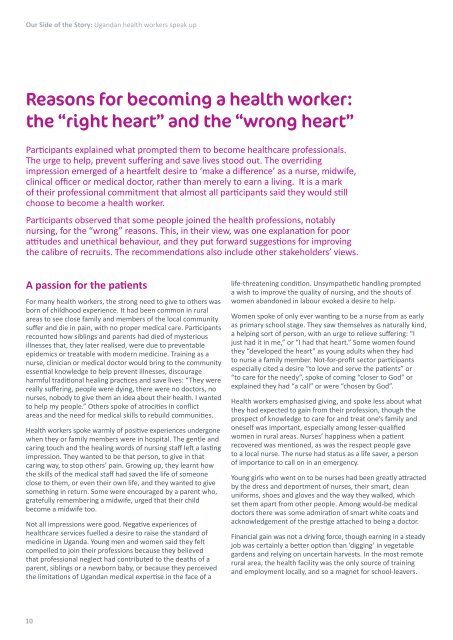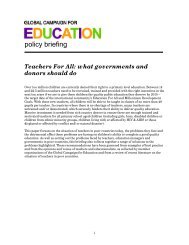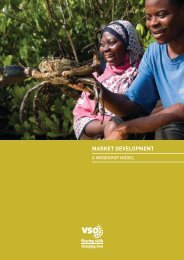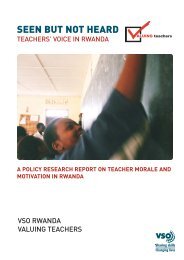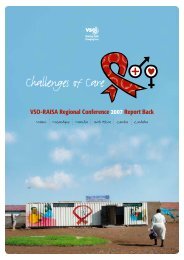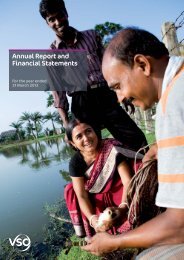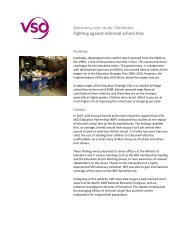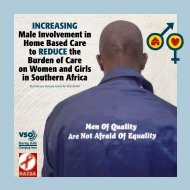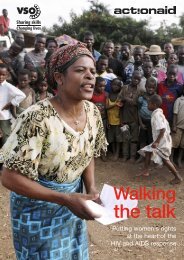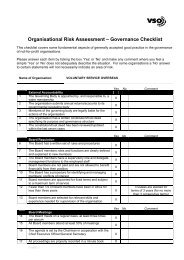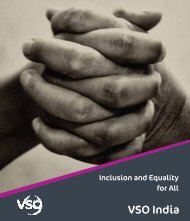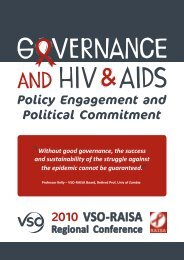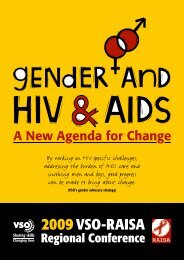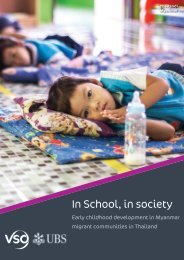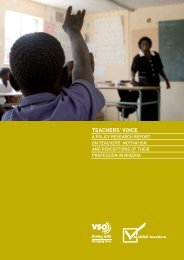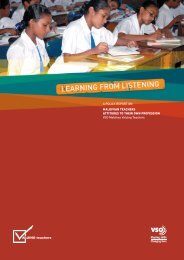Our Side of the Story - Ugandan health workers speak up - VSO
Our Side of the Story - Ugandan health workers speak up - VSO
Our Side of the Story - Ugandan health workers speak up - VSO
Create successful ePaper yourself
Turn your PDF publications into a flip-book with our unique Google optimized e-Paper software.
<strong>Our</strong> <strong>Side</strong> <strong>of</strong> <strong>the</strong> <strong>Story</strong>: <strong>Ugandan</strong> <strong>health</strong> <strong>workers</strong> <strong>speak</strong> <strong>up</strong><br />
Reasons for becoming a <strong>health</strong> worker:<br />
<strong>the</strong> “right heart” and <strong>the</strong> “wrong heart”<br />
Participants explained what prompted <strong>the</strong>m to become <strong>health</strong>care pr<strong>of</strong>essionals.<br />
The urge to help, prevent suffering and save lives stood out. The overriding<br />
impression emerged <strong>of</strong> a heartfelt desire to ‘make a difference’ as a nurse, midwife,<br />
clinical <strong>of</strong>ficer or medical doctor, ra<strong>the</strong>r than merely to earn a living. It is a mark<br />
<strong>of</strong> <strong>the</strong>ir pr<strong>of</strong>essional commitment that almost all participants said <strong>the</strong>y would still<br />
choose to become a <strong>health</strong> worker.<br />
Participants observed that some people joined <strong>the</strong> <strong>health</strong> pr<strong>of</strong>essions, notably<br />
nursing, for <strong>the</strong> “wrong” reasons. This, in <strong>the</strong>ir view, was one explanation for poor<br />
attitudes and unethical behaviour, and <strong>the</strong>y put forward suggestions for improving<br />
<strong>the</strong> calibre <strong>of</strong> recruits. The recommendations also include o<strong>the</strong>r stakeholders’ views.<br />
A passion for <strong>the</strong> patients<br />
For many <strong>health</strong> <strong>workers</strong>, <strong>the</strong> strong need to give to o<strong>the</strong>rs was<br />
born <strong>of</strong> childhood experience. It had been common in rural<br />
areas to see close family and members <strong>of</strong> <strong>the</strong> local community<br />
suffer and die in pain, with no proper medical care. Participants<br />
recounted how siblings and parents had died <strong>of</strong> mysterious<br />
illnesses that, <strong>the</strong>y later realised, were due to preventable<br />
epidemics or treatable with modern medicine. Training as a<br />
nurse, clinician or medical doctor would bring to <strong>the</strong> community<br />
essential knowledge to help prevent illnesses, discourage<br />
harmful traditional healing practices and save lives: “They were<br />
really suffering, people were dying, <strong>the</strong>re were no doctors, no<br />
nurses, nobody to give <strong>the</strong>m an idea about <strong>the</strong>ir <strong>health</strong>. I wanted<br />
to help my people.” O<strong>the</strong>rs spoke <strong>of</strong> atrocities in conflict<br />
areas and <strong>the</strong> need for medical skills to rebuild communities.<br />
Health <strong>workers</strong> spoke warmly <strong>of</strong> positive experiences undergone<br />
when <strong>the</strong>y or family members were in hospital. The gentle and<br />
caring touch and <strong>the</strong> healing words <strong>of</strong> nursing staff left a lasting<br />
impression. They wanted to be that person, to give in that<br />
caring way, to stop o<strong>the</strong>rs’ pain. Growing <strong>up</strong>, <strong>the</strong>y learnt how<br />
<strong>the</strong> skills <strong>of</strong> <strong>the</strong> medical staff had saved <strong>the</strong> life <strong>of</strong> someone<br />
close to <strong>the</strong>m, or even <strong>the</strong>ir own life, and <strong>the</strong>y wanted to give<br />
something in return. Some were encouraged by a parent who,<br />
gratefully remembering a midwife, urged that <strong>the</strong>ir child<br />
become a midwife too.<br />
Not all impressions were good. Negative experiences <strong>of</strong><br />
<strong>health</strong>care services fuelled a desire to raise <strong>the</strong> standard <strong>of</strong><br />
medicine in Uganda. Young men and women said <strong>the</strong>y felt<br />
compelled to join <strong>the</strong>ir pr<strong>of</strong>essions because <strong>the</strong>y believed<br />
that pr<strong>of</strong>essional neglect had contributed to <strong>the</strong> deaths <strong>of</strong> a<br />
parent, siblings or a newborn baby, or because <strong>the</strong>y perceived<br />
<strong>the</strong> limitations <strong>of</strong> <strong>Ugandan</strong> medical expertise in <strong>the</strong> face <strong>of</strong> a<br />
life-threatening condition. Unsympa<strong>the</strong>tic handling prompted<br />
a wish to improve <strong>the</strong> quality <strong>of</strong> nursing, and <strong>the</strong> shouts <strong>of</strong><br />
women abandoned in labour evoked a desire to help.<br />
Women spoke <strong>of</strong> only ever wanting to be a nurse from as early<br />
as primary school stage. They saw <strong>the</strong>mselves as naturally kind,<br />
a helping sort <strong>of</strong> person, with an urge to relieve suffering: “I<br />
just had it in me,” or “I had that heart.” Some women found<br />
<strong>the</strong>y “developed <strong>the</strong> heart” as young adults when <strong>the</strong>y had<br />
to nurse a family member. Not-for-pr<strong>of</strong>it sector participants<br />
especially cited a desire “to love and serve <strong>the</strong> patients” or<br />
“to care for <strong>the</strong> needy”, spoke <strong>of</strong> coming “closer to God” or<br />
explained <strong>the</strong>y had “a call” or were “chosen by God”.<br />
Health <strong>workers</strong> emphasised giving, and spoke less about what<br />
<strong>the</strong>y had expected to gain from <strong>the</strong>ir pr<strong>of</strong>ession, though <strong>the</strong><br />
prospect <strong>of</strong> knowledge to care for and treat one’s family and<br />
oneself was important, especially among lesser-qualified<br />
women in rural areas. Nurses’ happiness when a patient<br />
recovered was mentioned, as was <strong>the</strong> respect people gave<br />
to a local nurse. The nurse had status as a life saver, a person<br />
<strong>of</strong> importance to call on in an emergency.<br />
Young girls who went on to be nurses had been greatly attracted<br />
by <strong>the</strong> dress and deportment <strong>of</strong> nurses, <strong>the</strong>ir smart, clean<br />
uniforms, shoes and gloves and <strong>the</strong> way <strong>the</strong>y walked, which<br />
set <strong>the</strong>m apart from o<strong>the</strong>r people. Among would-be medical<br />
doctors <strong>the</strong>re was some admiration <strong>of</strong> smart white coats and<br />
acknowledgement <strong>of</strong> <strong>the</strong> prestige attached to being a doctor.<br />
Financial gain was not a driving force, though earning in a steady<br />
job was certainly a better option than ‘digging’ in vegetable<br />
gardens and relying on uncertain harvests. In <strong>the</strong> most remote<br />
rural area, <strong>the</strong> <strong>health</strong> facility was <strong>the</strong> only source <strong>of</strong> training<br />
and employment locally, and so a magnet for school-leavers.<br />
10


